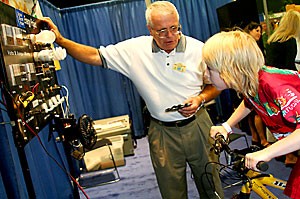Hybrid cars, rainwater harvesting systems and free bicycle rentals were all on display at the Tucson Convention Center last Friday and Saturday as part of the Tucson Alternative Energy Expo.
Many groups had working examples of their products on display, including the Arizona Solar Racing Team, which displayed its 2007 solar car.
“”The unique thing about this car is that we are reusing the body from the last race,”” said Wei-Ren Ng, a UA chemical engineering senior and member of the Arizona Solar Racing Team.
The car is covered in hundreds of two-by-three inch solar panels designed to fuel the car during the 2,000-mile 2008 Solar America Challenge.
The last competition, in 2005, took participants from Texas through Canada in an 11-day, 2,300-mile race, Ng said.
Though the car looks futuristic and may not resemble anything that could sustain a collision, he said the car doesn’t compete alone.
“”The solar car is sandwiched between two vehicles on the highway so it’s pretty safe,””
Ng added.
Another group, City Cycle, also provided an alternative form of transportation.
Tom Thivener, City Cycle’s bicycle and pedestrian coordinator, started the new bicycle rental company, which has served about 30 people so far. “”City employees can check out a bike at lunch time to ride down the Santa Cruz River for example, and it’s completely free,”” Thivener said.
Though citizens must work downtown to use the bikes, Thivener is encouraging employers throughout Tucson to invest in the bike program.
“”I got a whole fleet of bikes for $5,000,”” Thivener said. “”I think other employers should do the same, and the UA could be a prime example.””
From two wheels to four, the energy expo had a range of options for the environmentally conscious.
Ed Fraser of Precision Toyota explained the benefits of hybrid cars like the Prius and talked about the future of hydrogen-fueled vehicles.
“”We have many hydrogen prototypes already on the road,”” Fraser said. “”There are vendors at this convention that could provide hydrogen fueling stations in the future.””
The three biggest challenges right now are size, weight and cost, Fraser said, but those could be overcome in the next five to 10 years.
Another alternative energy vendor was Jason McHolm, owner and co-founder of Rainwater Harvesting Systems.
McHolm started the project a few years ago with his brothers. They helped a client collect rainwater from a roof gutter by routing the water through a pipe into a storage bin.
Since then, McHolm and his family have installed hundreds of rainwater collecting bins to help Tucsonans capitalize on rainwater that usually dissipates after a few days. Based on the size of a house’s roof and the size of the rainwater bin, clients can store thousands of gallons of water every year.
“”We used the water for my brother’s garden and the plants started growing everywhere,”” Mcholm said. “”It made such a huge difference.””
Though the water isn’t intended for household use, McHolm said there are companies in town that can filter the run-off, which is much cleaner and more palatable than effluent water.
“”I don’t mind drinking my own pee,”” McHolm said. “”It’s my neighbor’s pee I don’t want.””









